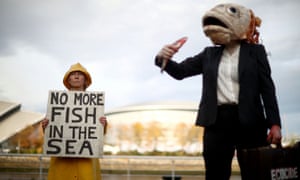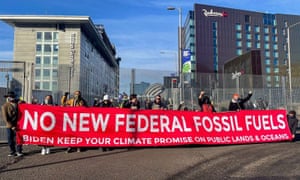
-
12.41pm EDT
12:41UN special adviser says don’t ‘celebrate’ 1.8C, world still on ‘catastrophic pathway’
-
12.10pm EDT
12:10Half world’s fossil fuel assets could become worthless by 2036 in net zero transition
-
11.41am EDT
11:41Cop26 commitments could limit global heating to 1.8C
-
9.33am EDT
09:33Big oil is feeling left out at Cop26
-
9.17am EDT
09:17ScotRail warns upwards of 50,000 people expected at Saturday protest
-
8.08am EDT
08:08Insulate Britain has blocked Parliament Square in central London
-
7.54am EDT
07:54The global transition to clean power needs to be five times faster, says Kwarteng
2.07pm EDT
14:07
Today’s summary

Oliver Holmes
Time’s up on Day 4. Its been a pleasure to blog the conference that will, one way or another, decide our fate. Tune in tomorrow.
Here is what happened today:
New research suggests about half the world’s fossil fuel assets could become worthless by 2036 under a net zero transition. A drop in demand for oil and gas will reshape the geopolitical landscape, with countries that are slow to decarbonise likely to suffer but early movers will profit.
The International Energy Agency said country pledges at Cop26 could limit global temperature rise to 1.8C. The figure is lower than the 2C prediction made a day earlier. However, others have warned not to get complacent with estimates. The world remains on “a 2.7 degree pathway, a catastrophic pathway”, said Selwin Hart, UN Special Adviser.
Scientists have warned of a “reality check” for the world’s nations gathered at Cop26 after they discovered that carbon emissions have shot back to the record level seen before the coronavirus pandemic.
UK activist group, Insulate Britain, blocked Parliament Square in central London. The protest was an apparent response to critics who have accused them of targeting the wrong people. The group is calling on the government to commit to a programme to insulate all Britain’s homes.
Scotland’s largest train operator, ScotRail, said upwards of 50,000 people are expected at a Saturday protest, and warned travellers that its services in and out of Glasgow will be “extremely busy” this weekend. Around 8,000 to 10,000 people would take part in Friday’s youth protests, it added.
Updated
at 2.10pm EDT
1.55pm EDT
13:55
As Energy Day draws to a close, James Thornton, founder and chief executive of the environmental law group ClientEarth, says it’s been a disappointing one.
James Thornton
(@JamesThorntonCE)As #COP26 Energy Day closes, having no clear deadline to end our reliance on #coal is disappointing. Current pledges and dates are too loose if we are to halve emissions by 2030 and meet #netzero by 2050. @AlokSharma_RDG said this was the COP that would consign coal to history.
Updated
at 2.15pm EDT
1.23pm EDT
13:23

Lisa O’Carroll
The Irish government has unveiled its sector-by-sector climate action targets involving what environment minister Eamon Ryan said will be “the defining challenges of our time”.
By 2030, it wants greenhouse gas emissions to be reduced by 51% with target reductions ranges as follows:
- Electricity: 62-81%
- Transport: 42-50%
- Buildings: 44-56%
- Industry/Enterprise: 29-41%
- Agriculture: 22-30%
- Land Use, Land Use Change and Forestry: 37-58%
The cornerstone of the policy is to increase the proportion of renewable electricity to up to 80% by 2030, including an increased target of up to 5 gigawatts of offshore wind.
Ryan said he thought transport would be the hardest target to meet but spoke of plans to change the entire police fleet to electric cars as a way of accelerating public attitudes to EVs.
He also spoke of “district heating at scale”, with a target of providing 8% of heating in these micro-networks.
Meanwhile, the deputy prime minister, Leo Varadkar, confirmed that Ireland would look at a scrappage scheme for car and van owners to achieve the target of 1m electric vehicles by 2030, something that had been ruled out previously.
Ministers did not comment on a recent KPMG report that suggested more than 1m of the 6.5m cattle herd would have to be culled to meet a 30% reduction in the agriculture sector.
Updated
at 1.38pm EDT
1.07pm EDT
13:07
This photo of locals in Glasglow watching a Cop26 demo march is too good not to post. Enjoy.

Updated
at 1.40pm EDT
12.55pm EDT
12:55

Diane Taylor
Indigenous leaders from West Papua, home to one of the largest and most diverse rainforests, have launched the world’s first “green state” at Cop26.
The contested Indonesian province declared a provisional “government-in-waiting” last year and promised to implement environmental and social protections with respect for the natural world.
Today it released its Green State Vision. It includes a three-point plan to try to prevent climate collapse. The plan pledges to:
- Make ecocide a serious criminal offence.
- Restore guardianship of natural resources to Indigenous communities.
- Serve notice on oil, gas, mining and logging companies to adhere to international environmental standards or cease operations.
Exiled leader Benny Wenda, interim president of the United Liberation Movement for West Papua and Provisional Government, said: “We are fighting for stewardship of one of the planet’s largest rainforests, a lung of the world. If you want to save the world, you must save West Papua.”
Jennifer Robinson, a barrister at the UK’s Doughty Street Chambers, who helped to draft the Green State Vision, said: “Ensuring West Papua’s right to self-determination will ensure the protection of the environment and the climate by allowing the Indigenous custodians of the land to take back control, protection and management of their resources.”
Updated
at 1.42pm EDT
12.41pm EDT
12:41
UN special adviser says don’t ‘celebrate’ 1.8C, world still on ‘catastrophic pathway’
Hold the brakes! Moments after the International Energy Agency said Cop26 commitments could limit global temperature rises to 1.8C, another official has warned we are still on a “catastrophic pathway”.
My colleague, Jillian Ambrose reports:
Selwin Hart, UN special adviser and assistant secretary-general for climate change, has warned Cop delegates that the fight to limit global heating is “far from over”.
“Fatih, I heard your numbers, but based on the NDCs that have been submitted, the world is on a 2.7 degree pathway, a catastrophic pathway, and therefore we are a long way away from keeping the 1.5 degree goal of the Paris agreement alive,” he said.
Hart received applause as he continued.
“We cannot be complacent. We cannot celebrate before we’ve done the job. We must recognise that this is a fight that we cannot afford to lose. I urge all of you to keep up the fight.”
- Note: This post earlier quoted the special advisor as saying the Paris agreement goal was 1.3C. It has been changed to 1.5C.
Updated
at 1.44pm EDT
12.10pm EDT
12:10
Half world’s fossil fuel assets could become worthless by 2036 in net zero transition

Jonathan Watts
About half of the world’s fossil fuel assets will be worthless by 2036 under a net zero transition, according to research.
Countries that are slow to decarbonise will suffer but early movers will profit; the study finds that renewables and freed-up investment will more than make up for the losses to the global economy.
It highlights the risk of producing far more oil and gas than required for future demand, which is estimated to leave $11tn-$14tn (GBP8.1tn-GBP10.3tn) in so-called stranded assets – infrastructure, property and investments where the value has fallen so steeply they must be written off.
The lead author, Jean-Francois Mercure of the University of Exeter, said the shift to clean energy would benefit the world economy overall, but it would need to be handled carefully to prevent regional pockets of misery and possible global instability.
“In a worst-case scenario, people will keep investing in fossil fuels until suddenly the demand they expected does not materialise and they realise that what they own is worthless. Then we could see a financial crisis on the scale of 2008,” he said, warning oil capitals such as Houston could suffer the same fate as Detroit after the decline of the US car industry unless the transition is carefully managed.
The challenge is evident at the ongoing Cop26 climate conference, where some of the nations most at risk of being left with stranded assets – such as the oil and gas exporters Russia and Brazil – are likely to try to slow down the transition as they have done at previous climate meetings, while those most likely to gain – such as the fuel-importing EU – are pushing for faster action.
The new paper, published in Nature Energy, illustrates how a drop in demand for oil and gas before 2036 will reshape the geopolitical landscape. Current investment flows and government commitments to reach net zero emissions by 2050 will make renewable energy more efficient, cheaper and stable, while fossil fuels will be hit by more price volatility. Many carbon assets, such as oil or coal reserves, will be left unburned, while machinery will also be stranded and no longer produce value for its owners.
Read about it here:
Updated
at 12.31pm EDT
11.41am EDT
11:41
Cop26 commitments could limit global heating to 1.8C

Damian Carrington
The International Energy Agency has crunched the numbers and reckons that combining the new pledges to cut emissions made by nations – most notably India – with the plan for 90 countries to reduce methane emissions by 30% by 2030 would mean global temperature rise would be limited to 1.8C.
IEA chief Faith Birol announced the news in a tweet:
It follows similar snap analyses of the new national pledges alone by European Union officials and University of Melbourne researchers, which both calculated a limit of 1.9C of global heating.
There’s a big “if”. These temperature limits will only be realised if every nation fully implements all of their pledges in coming years and some pledges from developing countries are dependent on funding from rich ones. The limits are also short of the 1.5C target needed to avoid the worst impacts of the climate crisis.
But the temperature indicated by pledges made up until COP26 began was 2.7C – a catastrophic level. A shift to 1.8C or 1.9C, if confirmed, might well meet a key goal of Cop26, which is to keep the chance of 1.5C alive.
11.30am EDT
11:30

Oliver Milman
Joe Biden, who urged world leaders at Cop26 to confront the “existential threat” of the climate crisis, is increasingly viewed as something of a hypocrite by climate campaigners in Glasgow, who hit out at his US administration today.
A large banner reading No New Federal Fossil Fuels was unfurled by activists outside the summit ahead of an appearance today by Deb Haaland, Biden’s interior secretary. Protestors are furious that Haaland’s department has been handing out oil and gas drilling permits at a rate of more than 300 a month, with an auction of 80m acres – an area larger than the UK – set to be leased this month to fossil fuel companies seeking to exploit the Gulf of Mexico.

Separately, environmental groups ran an advert in The Herald, Scotland’s largest daily newspaper, today urging Biden to reject a slew of proposed gas pipelines and plants. Fossil fuel activity on US public lands is responsible for around a quarter of the planet-heating emissions coming from the world’s second-largest carbon polluter.
“President Biden’s refusal to halt federal fossil fuel expansion is an inexcusable climate atrocity that makes a mockery of US climate goals in Glasgow,” said Ben Goloff, a senior campaigner at the Center for Biological Diversity. “We’re out of time. The president must use his executive authority to halt fossil fuel extraction on public lands, declare a climate emergency and make renewable energy available to everyone.”
Updated
at 11.43am EDT
11.20am EDT
11:20
A collective of Indigenous elders from the Americas, called the Minga Indigena, have been holding talks, celebrations, dance and music in Glasglow this week.
The only problem is that the venue and arts space they are doing it at, the Tramway, was unable to host their sacred fire overnight as they couldn’t leave it burning.
A group of activists called the GalGael, who hailed from Glasgow’s anti-motorway expansion protests of the 1990s, stepped in to help last night, agreeing to host the fire at their community centre.

“Delegates looking to find a bit of Glasgow not just put on for Cop26 would do well to drop in here, too,” writes my colleague, Libby Brooks.
“Currently they are hosting Cop visitors who have struggled with finding affordable accommodation in a marquee behind the workshop.”

Updated
at 11.20am EDT
10.14am EDT
10:14
Be careful what you read.
Facebook was accused by researchers today of being one of “the world’s biggest purveyors of climate disinformation,” my colleague Kari Paul reports.
The Real Facebook Oversight Board, an independent watchdog group, and environmental nonprofit Stop Funding Heat, analysed a dataset of more than 195 Facebook pages and groups. Researchers found an estimated 818,000 posts downplaying or denying the climate crisis.
The scale of climate misinformation on Facebook is “staggering” and “increasing quite substantially”, they said in a report.
Facebook has not immediately responded to a request for comment. It previously stated it continues to counteract the spread of misinformation by flagging climate information and referring users to its Climate Change Science Center, which contains data from credible sources on the climate crisis.
Updated
at 10.20am EDT
9.50am EDT
09:50
More photos here from reporter Damien Gayle, who is in Parliament Square where an Insulate Britain protester has glued his hand to a police van.
Damien Gayle
(@damiengayle)This #insulatebritain member has glued himself to a police van. pic.twitter.com/tdMyiCiWWl
And another person jumped on top…
Damien Gayle
(@damiengayle)Another #InsulateBritain activist has climbed on top of a police van. pic.twitter.com/0llKo8uy53
You can read more on Insulate Britain here:
9.33am EDT
09:33
Extraordinary plan being reported by Bloomberg Green. A group of scientists, engineers, politicians, and a ship captain went out in a boat to look at Manhattan Island and discuss ways of protecting it: their suggestion is a $40bn construction project to build gigantic iron sea gates to keep out the sea.
9.33am EDT
09:33
Big oil is feeling left out at Cop26
Damian Carrington reports that big oil is feeling left out at Cop26, with BP’s VP for strategy, Giulia Chierchia, calling yesterday for “inclusiveness” at future UN climate summits, “especially for businesses in harder to abate sectors”.
Last week Shell CEO Ben van Beurden said: “We are not represented [at Cop26]. We were told that we were not welcome, so we will not be there.” Yesterday, van Beurden raised eyebrows by claiming the company could become net zero by 2050, but would need the cash from its oil and gas business to pay for it.
In October, my colleague Matthew Taylor reported that private emails from civil servants in the Cop unit showed doubts about BP’s net zero plans, with an official saying the company “[does] not currently fit our success criteria for Cop26” and another noting “it’s unclear whether [its net zero] commitments stack up yet”.
The Guardian revealed in 2020 that fossil fuel firms had held a series of private meetings with UK officials in an attempt to be part of Cop26. But a Cop spokesperson later said officials from big oil could attend fringe events but would have no formal role in the summit. However, the UK government had many more private meetings with fossil fuel companies than clean energy firms between July 2019 and March 2021.
Updated
at 11.06am EDT
9.17am EDT
09:17
ScotRail warns upwards of 50,000 people expected at Saturday protest

Oliver Holmes
Scotland’s largest train operator, ScotRail, has warned travellers its services in and out of Glasgow will be “extremely busy” this weekend because it is expecting tens of thousands of activists to join Cop protests, with long queues at stations forecast, the Guardian’s Scotland Editor, Severin Carrell, reports.
ScotRail said there were estimates that 8,000 to 10,000 people would take part in Friday’s youth protests. It said “upwards of 50,000 people” would take part in the main Cop protests on Saturday, which are due to leave Kelvingrove park at 12.30 pm.
Oliver Holmes here, taking over the liveblog from Bibi van der Zee. We’ve got our team on the ground in Glasglow sending updates, from Greta Thunberg walkouts to electric planes to major announcements (hint hint).
If you are at Cop26, or watching from afar, you can contact me with information or suggestions at oliver.holmes@theguardian.com, or @olireports.
Updated
at 9.41am EDT
9.07am EDT
09:07

Bibi van der Zee
I’m just about to hand over to my colleague Oliver Holmes, who’ll be manning the liveblog all afternoon. We’ll keep an eye on Insulate Britain, and see how much longer they stay in Parliament Square.
And we’ll also carry on following energy day at Cop26, where ministers are talking about their plans and hopes for a just energy transition. Sounds as if there will be some interesting announcements this afternoon. Thanks for following along with us!
Updated
at 9.36am EDT
8.52am EDT
08:52
Nina Lakhani
Indigenous people from Alaska to Patagonia are at the Tramway on the south side of Glasgow to discuss sustainable climate solutions based on centuries of indigenous knowledge, spiritual customs and traditions.
It’s an event organised by the Minga movement, an Indigenous solidarity network in the Americas who refuse to participate inside the official Cop talks and negotiations. They are aiming to call out false climate solutions like net zero and carbon markets. The climate crisis cannot be solved through further exploitation and marketisation of natural resources, they argue, as that’s what has led to the climate breakdown communities are starting to experience.
More than 130 Indigenous youth and elders, from the Mixtecas of Oaxaca in southern Mexico, to Mapuches from Chile are here with the Minga collective, being hosted by local families, solidarity groups and churches. They all bring personal stories about the impact of land loss, water shortages and forced displacement, which they say will get worse if world leaders forge ahead with climate actions such as carbon capture and mass reforestation.
“Putting a price on natural resources is an act of colonialism and inhumanity. But there is another way,” said Calfin Lafkenche, a Mapuche organiser.
Updated
at 9.25am EDT
